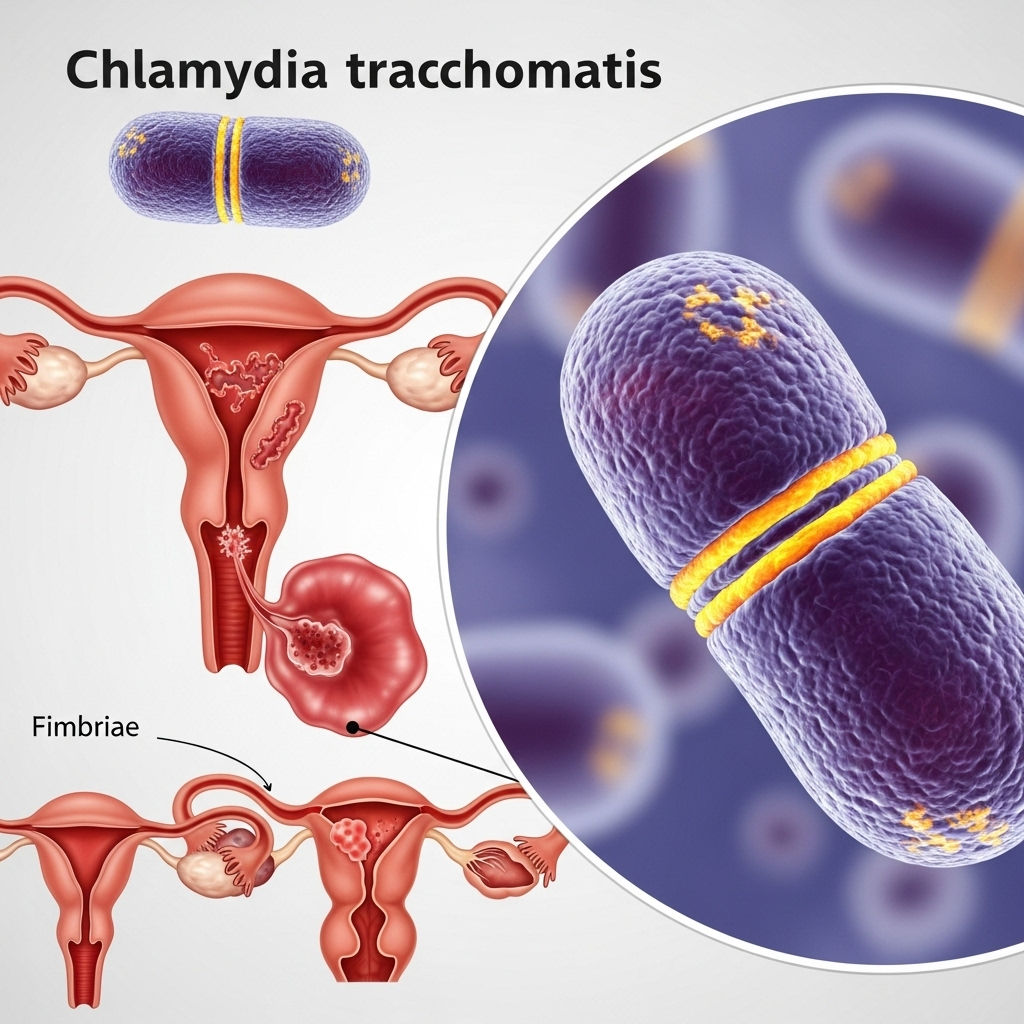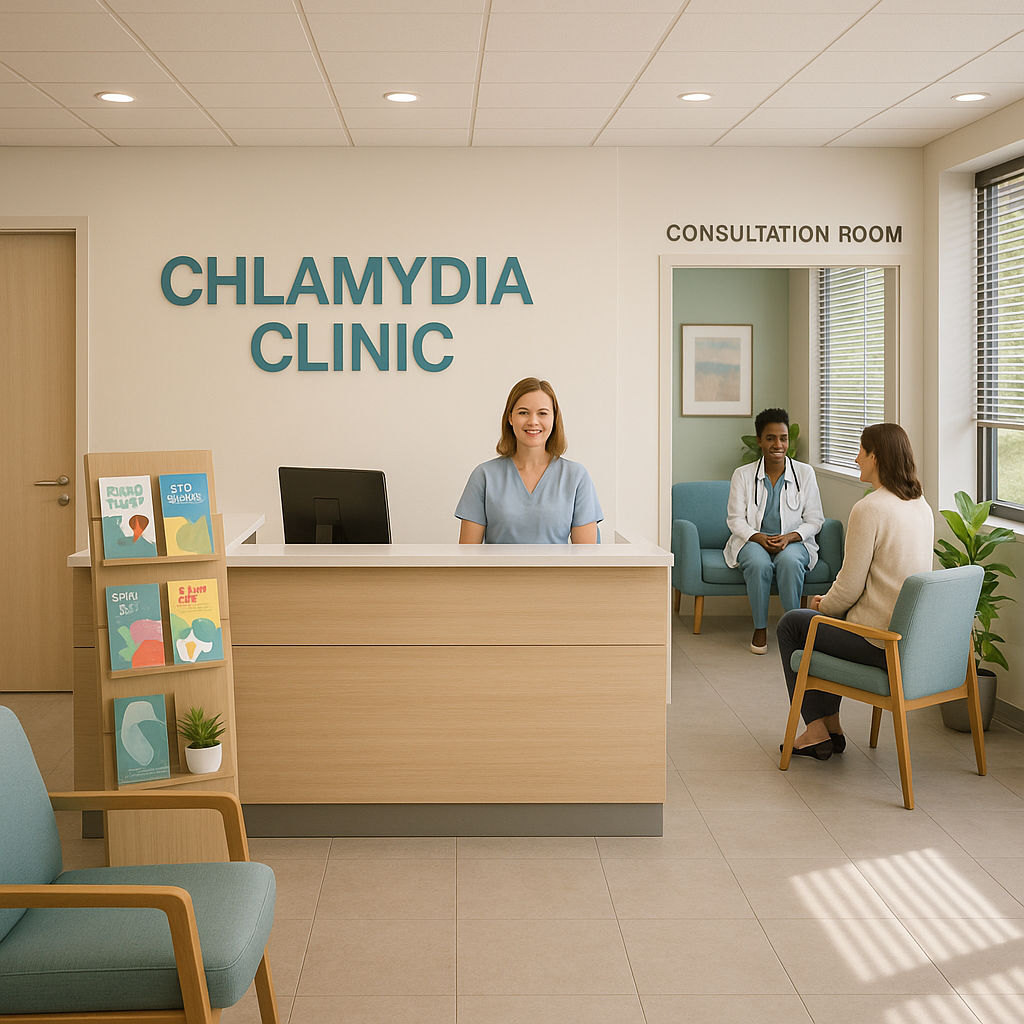Chlamydia is a sexually transmitted infection (STI) that I have come to realize is more common than many people think. It is caused by the bacterium Chlamydia trachomatis and can affect both men and women. One of the most alarming aspects of chlamydia is that it often presents no symptoms, which can lead to serious health complications if left untreated.
When symptoms do occur, they may include abnormal discharge from the genitals, burning sensations during urination, and pain during sexual intercourse. In women, it can also lead to pelvic inflammatory disease (PID), which can cause chronic pain and infertility. For men, untreated chlamydia can result in epididymitis, an inflammation of the tube that carries sperm.
The risks associated with chlamydia extend beyond the immediate physical symptoms. I have learned that untreated chlamydia can increase the likelihood of contracting or transmitting other STIs, including HIV. The silent nature of this infection makes it particularly dangerous; many individuals may unknowingly spread the infection to their partners.
Additionally, the long-term consequences of untreated chlamydia can be severe, affecting reproductive health and overall well-being. Understanding these risks has motivated me to prioritize my sexual health and seek regular testing. If you are concerned about your sexual health, it’s important to visit an STD screening and treatment center for proper care.
Key Takeaways
- Chlamydia is a common sexually transmitted infection with symptoms including genital discharge, burning during urination, and pelvic pain.
- Regular STD testing is crucial for early detection and treatment of chlamydia, as untreated infections can lead to serious health complications.
- When looking for a chlamydia clinic, it’s important to consider factors such as testing accuracy, treatment options, and confidentiality policies.
- Confidentiality and privacy are essential in STD care to ensure patients feel comfortable seeking testing and treatment without fear of judgment or stigma.
- Follow-up care is important in treating chlamydia to ensure the infection is fully cleared and to prevent re-infection, and prevention efforts should include education and access to resources for safe sexual practices.
Importance of Regular STD Testing and Treatment
Regular STD testing is crucial for maintaining sexual health, and I have come to appreciate its importance firsthand. Many people, including myself, may feel hesitant or embarrassed about getting tested for STIs. However, I have learned that regular testing is a responsible practice that not only protects my health but also the health of my partners.
The Centers for Disease Control and Prevention (CDC) recommends that sexually active individuals get tested at least once a year, especially those with multiple partners or those who engage in unprotected sex. By making testing a routine part of my healthcare, I can catch infections like chlamydia early and receive prompt treatment. Treatment for chlamydia is straightforward and effective, typically involving a course of antibiotics.
I have found that knowing I can easily treat an infection alleviates some of the anxiety surrounding STIs. However, it is essential to follow through with treatment and inform any sexual partners so they can also get tested and treated if necessary. This collective approach not only helps in eradicating the infection but also fosters a culture of openness and responsibility regarding sexual health.
Finding the Best Chlamydia Clinic: What to Look For

When searching for a clinic to get tested for chlamydia, I have learned that there are several factors to consider to ensure I receive quality care. First and foremost, I look for clinics that specialize in sexual health and STIs. These clinics often have staff who are knowledgeable about the latest testing methods and treatment options.
Additionally, I prioritize clinics that offer a welcoming and non-judgmental environment, as feeling comfortable during the testing process is essential for me. Another critical aspect is the availability of confidential services. I want to ensure that my personal information remains private throughout the testing and treatment process.
Many clinics offer anonymous testing options, which can provide peace of mind. Furthermore, I consider the clinic’s accessibility in terms of location and hours of operation. A clinic that is easy to reach and has flexible hours makes it more likely that I will follow through with regular testing.
The Role of Confidentiality and Privacy in STD Care
| Metrics | Data |
|---|---|
| Number of STD cases | 10,000 |
| Percentage of patients seeking confidential STD care | 80% |
| Effectiveness of confidential STD care in reducing transmission | 90% |
| Percentage of patients concerned about privacy in STD care | 70% |
Confidentiality and privacy are paramount when it comes to STD care, and I have come to understand their significance deeply. The stigma surrounding STIs can deter individuals from seeking help or getting tested, which is why I value clinics that prioritize patient confidentiality. Knowing that my medical history and test results will be kept private allows me to approach my sexual health without fear of judgment or repercussions.
Moreover, confidentiality extends beyond just the testing process; it encompasses all aspects of care, including treatment and follow-up appointments. I appreciate clinics that communicate clearly about their privacy policies and ensure that my information is secure. This commitment to confidentiality fosters trust between patients and healthcare providers, encouraging more individuals to seek the care they need without hesitation.
Treatment Options for Chlamydia and the Importance of Follow-up Care
When it comes to treating chlamydia, I have learned that there are effective options available. The most common treatment involves antibiotics, which can be administered as a single dose or over a week-long course. I find it reassuring to know that treatment is usually straightforward and highly effective when followed correctly.
However, it is crucial for me to complete the entire course of antibiotics as prescribed to ensure the infection is fully eradicated. Follow-up care is another essential component of managing chlamydia. After completing treatment, I understand the importance of getting retested after a few weeks to confirm that the infection has cleared up completely.
This follow-up not only provides peace of mind but also helps prevent any potential complications from arising due to lingering bacteria. Additionally, discussing any concerns or questions with my healthcare provider during follow-up appointments allows me to stay informed about my sexual health.
Preventing Chlamydia and Other STDs: Education and Resources

Prevention is key when it comes to chlamydia and other STDs, and I have found that education plays a vital role in this process. Understanding how STIs are transmitted empowers me to make informed decisions about my sexual health. For instance, practicing safe sex by using condoms consistently can significantly reduce the risk of contracting chlamydia and other STIs.
Additionally, I have learned about the importance of open communication with partners regarding sexual history and testing. There are numerous resources available for individuals seeking information about preventing STIs. I often turn to reputable websites such as the CDC or local health departments for accurate information on safe sex practices and available resources in my area.
Furthermore, educational workshops or community programs focused on sexual health can provide valuable insights and support for those looking to enhance their knowledge about STIs.
The Impact of Chlamydia on Sexual Health and Relationships
The impact of chlamydia on sexual health extends beyond physical symptoms; it can also affect emotional well-being and relationships. I have come to realize that receiving a positive diagnosis can be overwhelming and may lead to feelings of shame or anxiety. However, understanding that chlamydia is a common infection helps me approach the situation with a more balanced perspective.
Open communication with partners about STIs fosters trust and understanding, allowing us to navigate these challenges together. Moreover, untreated chlamydia can lead to serious complications that may affect future relationships or family planning. For instance, women may face difficulties conceiving due to scarring from PID caused by untreated infections.
Recognizing these potential consequences has motivated me to prioritize regular testing and treatment not only for my own health but also for the well-being of future partners.
The Future of Chlamydia Care: Advances in Testing and Treatment
As I look toward the future of chlamydia care, I am encouraged by the advances being made in testing and treatment options. Researchers are continually working on developing more accurate and faster testing methods that can provide results in real-time. This innovation could significantly reduce the anxiety associated with waiting for test results while also facilitating quicker treatment initiation.
Additionally, there is ongoing research into new treatment options that may enhance effectiveness or reduce side effects associated with current antibiotics. As our understanding of STIs evolves, I am hopeful that we will see improved strategies for prevention and education as well. By staying informed about these advancements, I can better advocate for my sexual health and contribute to a broader conversation about STIs in society.
In conclusion, navigating the complexities of chlamydia requires a proactive approach centered on understanding symptoms, seeking regular testing, prioritizing confidentiality, and embracing education as a means of prevention. By taking these steps seriously, I can protect not only my own health but also contribute positively to the sexual health landscape around me.
If you’re seeking comprehensive care for sexually transmitted diseases, it’s important to consider not only testing and treatment but also prevention and overall health management. While exploring options for top STD clinics for chlamydia, you might also be interested in learning about HIV prevention and symptoms. An informative resource on this topic is the article titled “HIV Symptoms: Do You Know How to Prevent It?” which provides valuable insights into recognizing symptoms and taking preventive measures. You can read more about it by visiting this link. This article complements your search for STD clinics by broadening your understanding of related health concerns.
FAQs
What is chlamydia?
Chlamydia is a common sexually transmitted infection (STI) caused by the bacterium Chlamydia trachomatis. It can infect both men and women and can cause serious, permanent damage to a woman’s reproductive system.
What are the symptoms of chlamydia?
Many people with chlamydia have no symptoms, but some may experience pain or burning during urination, unusual discharge from the penis or vagina, pain during sexual intercourse, and lower abdominal pain.
How is chlamydia diagnosed?
Chlamydia can be diagnosed through a simple urine test or a swab of the affected area. It is important to get tested regularly, especially if you are sexually active.
How is chlamydia treated?
Chlamydia can be easily treated and cured with antibiotics. It is important to complete the full course of antibiotics as prescribed by a healthcare provider.
Why is it important to seek treatment for chlamydia?
If left untreated, chlamydia can lead to serious health problems such as pelvic inflammatory disease (PID), infertility, and ectopic pregnancy. It can also increase the risk of contracting other STIs.
How can I find a top STD clinic for chlamydia testing and treatment?
You can find a top STD clinic for chlamydia testing and treatment by researching online, asking for recommendations from healthcare providers or friends, and checking for clinics that offer confidential and affordable testing and treatment options.


